July 25, 2015
DIY Fertility Acupressure
Bob Wong was raised in a traditional Chinese medicine family and moved to mainland China to study and train for almost a decade. During that time, he was able to learn from some of the top acupuncturists and Chinese Medicine practitioners in at the Guangzhou University of Chinese Medicine. His mission is not bring that knowledge and experience to help his patients.
Bob Wong currently maintains an acupuncture practice in the Brisbane area and lectures at the Endeavour College of Natural Health. For more information you can read his full bio or schedule and appointment.
*The owner of this site is not liable for any misfortune that should befall a visitor to this site.This site does not offer personal advice & no information on it can be construed as personal advice. In the event that you may feel our therapies may be of benefit, we advise you to contact the clinic to make an appointment for diagnosis and treatment.
July 25, 2015
DIY Fertility Acupressure points
July 24, 2015
Home Remedies: Chinese Tea For Dry Eyes
Chrysanthemum or “ju hua” is beneficial for vision. It is suitable for those who suffer from dry eyes or strain their eyes often at the computer. Modern research has shown that Ju hua is high in antioxidants. It is also often used to ward off cold and flu and can be a good immune system booster.
In Chinese Medicine, goji berries are known to nourish the kidneys and brain. They are also high in antioxidants, Vitamins C, B1, and B2. [1] It has gained much attention due to marketing recently and labeled a “super food” but the Chinese having been using it for centuries to improve and maintain health. Goji berries also have the ability to strengthen the eyes and nourish the Liver and Kidneys.
Ingredients:
1) Chrysanthemum 10g (8-10 cloves)
2) Goji Berries 6 g (small handful)
3) Organic Honey or Stevia (Optional)
*All ingredients can be purchased relatively cheap from an Asian herbal store. The chrysanthemum flowers (Ju Hua) are a specific variety used in Traditional Chinese Medicine. Please be sure to wash thoroughly before consuming!
Instructions:
- Add about 2 cups of water into a tea pot. (Add organic honey or stevia optional)
- Heat until boiling add the washed herbs of goji berries and Ju Hua.
- When the water is boiling again, lower heat down to a low simmer for about ten minutes.
- Remove from the stove. Enjoy!
Bob Wong was raised in a traditional Chinese medicine family and moved to mainland China to study and train for almost a decade. During that time, he was able to learn from some of the top acupuncturists and Chinese Medicine practitioners in at the Guangzhou University of Chinese Medicine. His mission is not bring that knowledge and experience to help his patients.
Bob Wong currently maintains an acupuncture practice in the Brisbane area and lectures at the Endeavour College of Natural Health. For more information you can read his full bio or schedule and appointment.
*The owner of this site is not liable for any misfortune that should befall a visitor to this site.This site does not offer personal advice & no information on it can be construed as personal advice. In the event that you may feel our therapies may be of benefit, we advise you to contact the clinic to make an appointment for diagnosis and treatment.
July 23, 2015
Home Remedies: Chinese Medicine Tea for Dry Eyes
July 21, 2015
Immediate Back Pain Relief Using Acupressure
Bob Wong was raised in a traditional Chinese medicine family and moved to mainland China to study and train for almost a decade. During that time, he was able to learn from some of the top acupuncturists and Chinese Medicine practitioners in at the Guangzhou University of Chinese Medicine. His mission is not bring that knowledge and experience to help his patients.
Bob Wong currently maintains an acupuncture practice in the Brisbane area and lectures at the Endeavour College of Natural Health. For more information you can read his full bio or schedule and appointment.
*The owner of this site is not liable for any misfortune that should befall a visitor to this site.This site does not offer personal advice & no information on it can be construed as personal advice. In the event that you may feel our therapies may be of benefit, we advise you to contact the clinic to make an appointment for diagnosis and treatment.
July 21, 2015
Immediate Sciatica Relief With Acupressure
In this Video we will talk about how to relieve buttock pain and Sciatica using acupressure. Sciatica is a very common ailment seen in Acupuncture clinics and the pain can be very bothersome and annoying for anyone going through it. We’ll talk about an easy DIY solution that may help you relieve the pain using acupressure:
Youtube Video Click HERE
For more Back Pain Relief cases check out youtube playlist HERE
Bob Wong was raised in a traditional Chinese medicine family and moved to mainland China to study and train for almost a decade. During that time, he was able to learn from some of the top acupuncturists and Chinese Medicine practitioners in at the Guangzhou University of Chinese Medicine. His mission is not bring that knowledge and experience to help his patients.
Bob Wong currently maintains an acupuncture practice in the Brisbane area and lectures at the Endeavour College of Natural Health. For more information you can read his full bio or schedule and appointment.
*The owner of this site is not liable for any misfortune that should befall a visitor to this site.This site does not offer personal advice & no information on it can be construed as personal advice. In the event that you may feel our therapies amy be of benefit, we advise you to contact the clinic to make an appointment for diagnosis and treatment.
July 19, 2015
Fertility Acupressure: 3 easy to learn points
Acupressure points for fertility a how to guide
Often times, women looking to get pregnant or undergoing IVF, seek the help and advice of an acupuncturist. Chinese medicine and acupuncture have been used for hundreds of years to treat infertility. Often times, patients will come in for treatment once a week but this is usually not enough to keep the body’s momentum going. A good way to supplement acupuncture would be to use do self acupressure.
Using hands rather than needles at points to promote the blood circulation and unblock the channels of the body. These points each have a close relationship to reproductive system of a woman’s body according to Chinese medicine. You can knead these points using to tip of your fingers at these points until a sore achy sensation is felt. It is best to do this twice a day for eight to ten minutes:
Kidney 1 (yong quan)
Kidney 1 otherwise known as “bubbling spring” is located on the sole of your foot. To find it, cup your foot in your hands, with the sole facing you. Now mentally divide your foot into three parts. If your heel is the first part and your toes are the third, the second part is the section that lies right behind the metatarsal joint. It’s basically the center of your sole. Place your thumb—the right thumb if you are right-handed, the left if you are left-handed—squarely on this spot. Place your second thumb next to the first and press down hard, wrapping your other fingers around your foot to get some leverage for applying pressure. Stimulating it helps awaken your body systems and slow down the aging process. It also helps to improve your circulation, particularly blood flow to your pelvic cavity, which in turn can help your egg quality.[1]
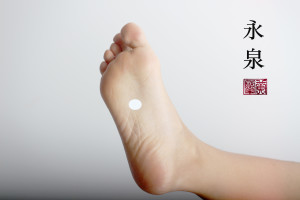
kd1 point
Spleen 6 (san yin jiao)
Sp6 or “three yin crossing” is one of the most frequently used points for women’s health. It is the crossing point of the kidney, liver, and spleen meridians, which are vital in organs in Chinese Medicine. This powerful point stimulates your female energy and strengthens your reproductive organs.[2] Using the inside of your ankle bone as a starting point, lay your four fingers horizontally across your ankle area. It is the area four finger breadths just off your shin bone.
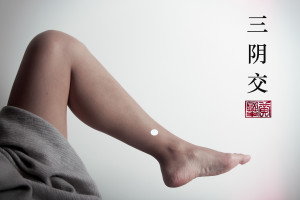
Sp6 point
Large intestine 4 (he gu)
Li4 “joining valley” Is located at the middle junction of your index finger and thumb. This point is good for the immune system and for health in general. Located on the yang ming Large Intestine channel, it is used as a key point circulate blood and vital energy and one of the most commonly used points in acupuncture. It’s a source of pain relief, including pelvic pain, menstrual cramps, and headache. It’s also good for adjusting your nervous system and for bringing circulation throughout your entire body.[3]
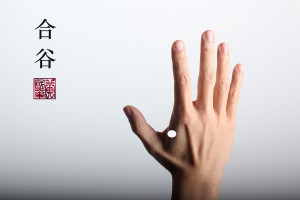
Li4 point
*Please do not use these points if you are pregnant or think you may be pregnant. If and when in doubt please consult your practitioner if you have any questions or feel free to send an email to: Wongguohua@gmail.com
Bob Wong was raised in a traditional Chinese medicine family and moved to mainland China to study and train for almost a decade. During that time, he was able to learn from some of the top acupuncturists and Chinese Medicine practitioners in at the Guangzhou University of Chinese Medicine. His mission is not bring that knowledge and experience to help his patients.
Bob Wong currently maintains an acupuncture practice in the Brisbane area and lectures at the Endeavour College of Natural Health. For more information you can read his full bio or schedule and appointment.
*The owner of this site is not liable for any misfortune that should befall a visitor to this site.This site does not offer personal advice & no information on it can be construed as personal advice. In the event that you may feel our therapies may be of benefit, we advise you to contact the clinic to make an appointment for diagnosis and treatment.
July 12, 2015
Dang Gui Chicken Soup
4 pieces da zao
6 grams gan cao
6 grams shan yao
6 grams dang gui
organic chicken broth or water to coverDirections
- Wash chicken, cut into halves, remove skin and fat and put in boiling water to rinse for 5 minutes, retrieve and rinse.
- Rinse herbs and dates.
- Put all ingredients in a casserole with enough hot water to cover the chicken and put on the cover.
- Place the casserole on a stainless steel cooling stand inside a pot or a wok with enough hot water at the bottom to reach up to the lower third of the casserole. Cover the pot or wok with lid.
- Steam over medium-high heat for 3 hours. Add boiling water to the cooking whenever necessary to maintain the steaming and prevent burning.
- Remove and add salt to serve. Drink soup mainly.
Combine all of the ingredients in a crock pot and cook on high for 1 1⁄2 –2 hours. Discard the herbs when the soup is ready.
**Dang Gui is NOT recommended if you are pregnant, have diarrhea or have abdominal fullness. Do not take this if you are pregnant of think you may be. This soup is also not to be taken during your period and it is a blood mover. **
Bob Wong was raised in a traditional Chinese medicine family and moved to mainland China to study and train for almost a decade. During that time, he was able to learn from some of the top acupuncturists and Chinese Medicine practitioners in at the Guangzhou University of Chinese Medicine. His mission is not bring that knowledge and experience to help his patients.
Bob Wong currently maintains an acupuncture practice in the Brisbane area and lectures at the Endeavour College of Natural Health. For more information you can read his full bio or schedule and appointment.
*The owner of this site is not liable for any misfortune that should befall a visitor to this site.This site does not offer personal advice & no information on it can be construed as personal advice. In the event that you may feel our therapies may be of benefit, we advise you to contact the clinic to make an appointment for diagnosis and treatment.
July 12, 2015
Top 5 Fertility Chinese Herbs
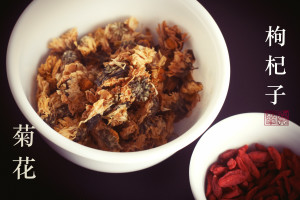
菊花 枸杞子
Chinese herbs have a long history of use in aiding fertility. Records indicating herbal treatment of infertility and miscarriage date back to 200 A.D. If you are looking for a way to enhance your fertility using Chinese medicine these may help you in your journey. These herbs are consumed as an herbal tea/ decoction or put in soups or porridges, depending on how a practitioner prescribes them. The top 5 herbs Chinese Medicine practitioners use when treating fertility:
1) Dang gui 当归 Angelicae Sinensis is best known for it’s blood tonifying properties. It is often prescribed for gynaelogical problems – menstrual irregularities and fertility issues, as well as poor blood circulation resulting in dizziness, paleness, fatigue. It has the ability to regulate a woman’s cycle and nourish the hormonal components and also supports estrogen production.[1] Dang gui can also be used in soups (recipe here) to help a woman’s body heal and rebuild after menses and or giving birth.
2 Gou qi zi 枸杞子 goji berries are high in antioxidants, Vitamins C, B1, and B2. It has gained much attention due to marketing in recently and labeled a “super food” but the Chinese having been using it for centuries to improve and maintain health. Goji berries have the ability to strengthen follicular activity and stimulates the uterus to thicken the lining. In men, It can improve sperm motility.[2] You can mix it with chrysanthemum and drink goji berries as a tea or use it as a garnish in soups.
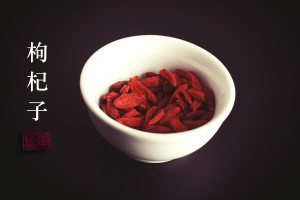
枸杞子
3) Tu si zi (菟丝子) doddler seeds are known to improve semen production in men and reduces chromosomal issues. In women, it can improve egg quality and can be beneficial for ovulation.[3] According to Chinese Medicine, it tonifies the kidneys and is indicated for impotence, nocturnal emission, and is traditionally used to calm the fetus in threatened miscarriage.
4) Rou cong rong 肉苁蓉 Cistanche is great because it helps clean the bowels and has a detoxing effect on the body. It has the ability to warm the uterus and increase blood circulation thereby improving hormonal release.[3] It has also been shown to be benifical during the profliferation.
5) Ba ji tian 巴戟天 Morinda officinalis is often used to treat PMS by stimulating blood circulation around the uterus. It may also help decrease aches and pains during pregnancy along with reducing the risk of miscarriage. Men can also use ba ji tian for erectile dysfunction (ED) and other sexual performance problems.[5]
As tempting as it may be to run out with this list and make your own formula, It is highly recommended that you use these herbs only under the guidance of a qualified, licensed practitioner of Chinese medicine. As complimentary medicine grows, more people are seeking out alternative ways to enhance fertility and improve their health. If you have any questions please feel free to contact us at: info@artofacupuncture.com.au
Bob Wong was raised in a traditional Chinese medicine family and moved to mainland China to study and train for almost a decade. During that time, he was able to learn from some of the top acupuncturists and Chinese Medicine practitioners in at the Guangzhou University of Chinese Medicine. His mission is not bring that knowledge and experience to help his patients.
Bob Wong currently maintains an acupuncture practice in the Brisbane area and lectures at the Endeavour College of Natural Health. For more information you can read his full bio or schedule and appointment.
*The owner of this site is not liable for any misfortune that should befall a visitor to this site.This site does not offer personal advice & no information on it can be construed as personal advice. In the event that you may feel our therapies may be of benefit, we advise you to contact the clinic to make an appointment for diagnosis and treatment.
July 11, 2015
Treating Bell’s Palsy With Chinese Medicine
Special Offer
Initial Exam $47
Includes: Tongue and Pulse Diagnosis, Facial Grading Assessment
Call Now
Bell’s Palsy is a form of paralysis on one side of the face characterized by deviated mouth, difficulty blinking and closing the eye, frowning and or smiling. It results from the 7th cranial nerve being inflamed and often times onset is very acute and rapid. It is the result of an audio-immune system function failure, Epstein Barr, post-viral infection. It may also be caused by herpes simplex virus (shingles.)(1)
Often times, patients with Bell’s Palsy will wake up all of the sudden and they can’t close their eyelids fully and start drooling or they start to feel numbness of one side of the face accompanied with headaches and dizziness. Patients usually rush to the emergency room or go to their local GP to rule out any possibility of stroke and neurological function failure. They are then often sent home with steroids or told “it will just go away on its own.” Sometimes it does and sometimes it doesn’t. This article will talk about 3 things you can do for Facial palsy using Chinese Medicine:
Acupuncture
1) The first thing that you should do for Bell’s Palsy is to see a licensed acupuncturist. What acupuncture does is it promote the body’s healing process and reduces the inflammation around the facial nerve. Acupuncture also works to improve the blood circulation in the area locally. Going through something like Bell’s palsy can be quite stressful and scary for some people. What acupuncture does is also releases endorphins which act as a natural pain reliever and has a calming effect.
Avoid Wind
2) Keep your face covered and avoid any air conditioned rooms, winds or cold drafts. According to Chinese medicine Bell’s Palsy is caused by “wind.” Often times patients report having slept with the window open or riding a motor cycle under heavy wind before waking up the next morning with facial palsy. To prevent the symptoms from getting worse keep the affected side of the face covered and away from cold drafts or air conditioned places.
Herbal Medicine
3) In Chinese Medicine, Bell’s Palsy is termed “External Wind-Cold attacking the channels of the face”. China, herbs have been used for thousands of years to assist in Bell’s Palsy recovery, and the initial treatment goal according to TCM would be to expel Wind and promote blood circulation to the face. Herbal remedies can help soothe the patient, expedite the paralysis from dissipating, and enhance nerve function.
Bob Wong was raised in a traditional Chinese medicine family and moved to mainland China to study and train for almost a decade. During that time, he was able to learn from some of the top acupuncturists and Chinese Medicine practitioners in at the Guangzhou University of Chinese Medicine. His mission is not bring that knowledge and experience to help his patients.
Bob Wong currently maintains an acupuncture practice in the Brisbane area and lectures at the Endeavour College of Natural Health. For more information you can read his full bio or schedule and appointment.
*The owner of this site is not liable for any misfortune that should befall a visitor to this site.This site does not offer personal advice & no information on it can be construed as personal advice. In the event that you may feel our therapies may be of benefit, we advise you to contact the clinic to make an appointment for diagnosis and treatment.
Special Offer
Initial Exam $47
Includes: Tongue and Pulse Diagnosis, Facial Grading Assessment
Call Now
